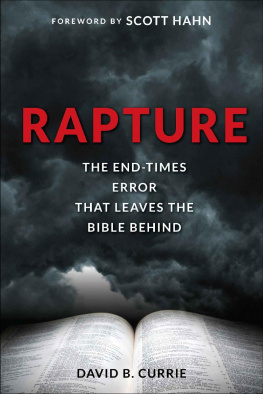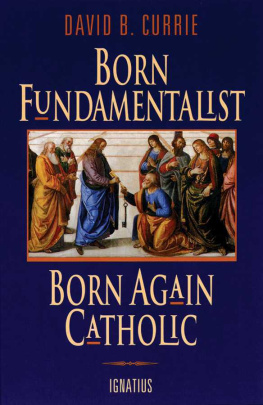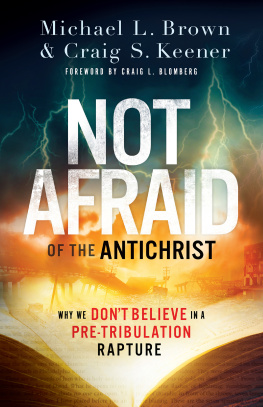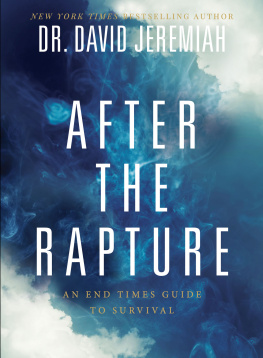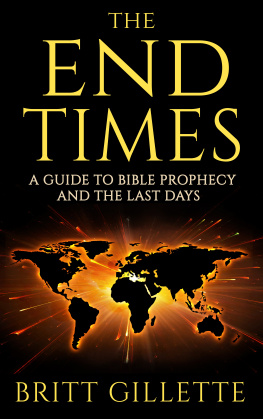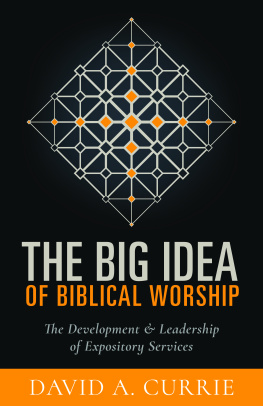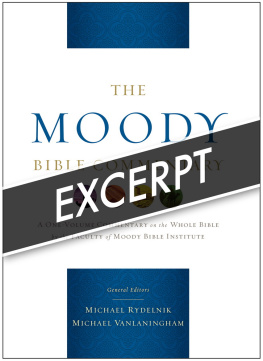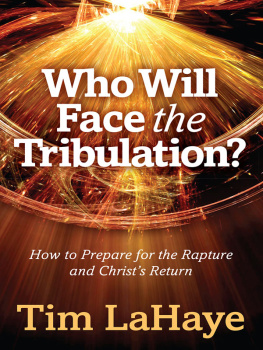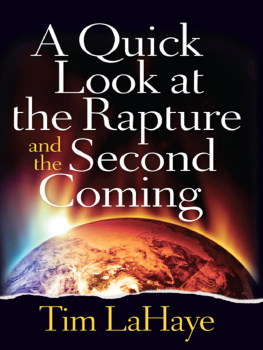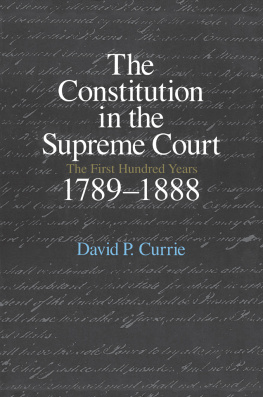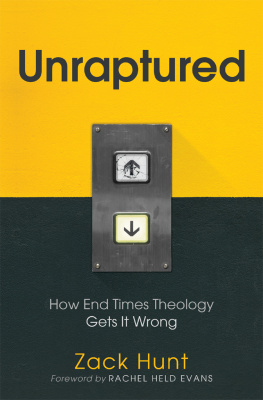David B. Currie - Rapture: The End-Times Error That Leaves the Bible Behind
Here you can read online David B. Currie - Rapture: The End-Times Error That Leaves the Bible Behind full text of the book (entire story) in english for free. Download pdf and epub, get meaning, cover and reviews about this ebook. year: 2011, publisher: Sophia Institute Press, genre: Religion. Description of the work, (preface) as well as reviews are available. Best literature library LitArk.com created for fans of good reading and offers a wide selection of genres:
Romance novel
Science fiction
Adventure
Detective
Science
History
Home and family
Prose
Art
Politics
Computer
Non-fiction
Religion
Business
Children
Humor
Choose a favorite category and find really read worthwhile books. Enjoy immersion in the world of imagination, feel the emotions of the characters or learn something new for yourself, make an fascinating discovery.
- Book:Rapture: The End-Times Error That Leaves the Bible Behind
- Author:
- Publisher:Sophia Institute Press
- Genre:
- Year:2011
- Rating:3 / 5
- Favourites:Add to favourites
- Your mark:
- 60
- 1
- 2
- 3
- 4
- 5
Rapture: The End-Times Error That Leaves the Bible Behind: summary, description and annotation
We offer to read an annotation, description, summary or preface (depends on what the author of the book "Rapture: The End-Times Error That Leaves the Bible Behind" wrote himself). If you haven't found the necessary information about the book — write in the comments, we will try to find it.
Rapture: The End-Times Error That Leaves the Bible Behind — read online for free the complete book (whole text) full work
Below is the text of the book, divided by pages. System saving the place of the last page read, allows you to conveniently read the book "Rapture: The End-Times Error That Leaves the Bible Behind" online for free, without having to search again every time where you left off. Put a bookmark, and you can go to the page where you finished reading at any time.
Font size:
Interval:
Bookmark:
SOPHIA INSTITUTE PRESS
Manchester, New Hampshire
Copyright 2003 David B. Currie
All rights reserved
Printed in the United States of America
Cover design by Theodore Schluenderfritz
Biblical citations are taken from the Revised Standard Version of the Bible 1971 by Division of Christian Education of the National Council of the Churches of Christ in the United States of America; all emphases added.
No part of this book may be reproduced, stored in a retrieval system, or transmitted in any form, or by any means, electronic, mechanical, photocopying, or otherwise, without the prior written permission of the publisher, except by a reviewer, who may quote brief passages in a review.
Sophia Institute Press
Box 5284, Manchester, NH 03108
1-800-888-9344
www.sophiainstitute.com
Library of Congress Cataloging-in-Publication Data
Currie, David B.
Rapture : the end-times error that leaves the Bible behind /
David B. Currie.
p. cm.
Includes bibliographical references.
ISBN 1-928832-72-5 (pbk. : alk. paper)
1. Rapture (Christian eschatology) 2. EschatologyBiblical teaching. 3. Catholic ChurchDoctrines.
I. Title.
BT887.C87 2003
236.9dc21 2003006717
03 04 05 06 07 08 09 10 9 8 7 6 5 4 3 2 1
Dedicated to
Colleen and our children:
Jonathan, Kathleen, Matthew,
Benjamin, Stephen, Alison,
Elisabeth, Daniel, and Mary:
Without their patience and love ,
life would be so gray .
While I take full responsibility
for any omissions or errors,
I gratefully acknowledge the
assistance of the following people:
Matthew and Benjamin Currie:
Their cheerful assistance
helped eliminate errors .
Thomas Howard:
His timely encouragement
enabled me to persevere .
Todd Aglialoro:
His able editing
proved invaluable .
By Scott Hahn
David Currie has written something remarkable here. Rapture is much more than its title suggests. Its more than a topical treatment of a Fundamentalist fad. Its more than a book of apologetics. Its more than the refutation of an interpretive error.
Im tempted to describe it as a virtual summa of apocalyptic texts and prophetic positions. In Rapture , Currie gives us a comprehensive collection of the biblical texts that Fundamentalist Protestants have commonly interpreted as end-times predictions. He subjects each passage to sane and sober analysis, correcting errors along the way, and establishing a range of reasonable interpretations, all in harmony with the Catholic Churchs living Tradition (see CCC, pars. 111114; see for publication details and for a list of abbreviations for works cited in this book).
If Currie had done no more than survey all these texts, he would have performed an invaluable service. Not only does he treat well-known passages from the Book of Revelation, but he also considers many lesser-known important texts from both the Old and New Testaments. The compilation itself encourages a contextual reading.
The Church interprets any scriptural text in its proper context, which is the entire Bible. The New Testament writers had a deep knowledge of the Old Testament books, and they assumed the same in their readers. Thus, Catholics have always found the Old Testament revealed in the New, and the New Testament concealed in the Old. This is why we hear readings from both Testaments every time we go to Mass. This is known as typology (see CCC, pars. 128130). The Pontifical Biblical Commission describes how the Churchs Liturgy makes this work: By regularly associating a text of the Old Testament with the text of the Gospel, the cycle often suggests a scriptural interpretation moving in the direction of typology ( The Interpretation of the Bible in the Church , IV, C, 1).
The Fundamentalist tendency, however, is to read each biblical text in isolation from other texts and from the larger context of Sacred Tradition, including the ancient Israelite prophetic traditions. The problem, of course, is that the texts themselves were not written to be read this way. The biblical authors assumed that their readers would all share a common life, liturgical worship, and awareness of history. For all these things were catholic (that is, universal) and held in common. Yet these are precisely the thingssacraments, Liturgy, and Traditionthat modern movements such as Fundamentalism have rejected. Lacking these interpretive keys, they end up groping and guessing at whats behind the locked doors of apocalyptic passages.
Currie applies sound Catholic principles to the many and various scriptural texts, treating them in their canonical orderand a wonderful thing happens along the way. Gradually, we realize that these texts are more than prophetic bursts of surreal images and shocking announcements. They actually present a unified, coherent interpretation of salvation history.
The sacred authors saw history in covenantal terms. The covenant revealed a consistent pattern of how God would deal with His people in every age. Through the covenants, Israel was established as Gods family, first as a nation (Moses) and then as a kingdom (David). Accordingly, the fatherly terms of each covenant included rewards as well as punishments: I set before you this day a blessing and a curse: the blessing, if you obey the commandments and the curse, if you do not (Deut. 11:2628). The covenant, then, is what helped make sense of the events, both pleasant and painful, that befell Israel and their surrounding gentile neighbors.
From age to age, Gods dealings with His people follow a consistent covenantal pattern of fatherly faithfulness, judgment, and mercy. That is why the prophets of ancient Israel could discern and describe Gods future acts of deliverance in terms that reflected and amplified His saving acts in Israels past. For example, Gods future restoration of the Davidic kingdom is announced in terms of a New Exodus, by several prophets (Isaiah, Jeremiah, Ezekiel, and Hosea). As Jean Cardinal Danielou once stated, Prophecy is the typological interpretation of history.
The biblical writers did indeed use cataclysmic imagery and cosmic figures to express world-ending events. For the world will surely end one day. But before the definitive end of the world, many worlds will come to an end. The Babylonian world came to an end, as did the world of the Pharaohs. The Israelite world came to an end, as did the world of the Second Temple Jews.
Indeed, the same pattern appears to continue on into the New Testament age. For the Roman world, the Byzantine world, the North African worldall these great worlds, great civilizations, came to an end, as will our own little world someday. Human history itself will eventually come to an end; we know neither the day nor the hour. But, until the absolute and plenary End, it will end many times over, as it were, on the installment plan. Thus the biblical apocalypses are timely for every age, and not just the last.
This is an important principle for us to understand, because the Bibles authority grows weak without it. Critics of the Scriptures like to point out that Jesus and the Apostles seemed to expect things on earth to come to a hasty conclusion. Before a generation had time to pass from the scene, the world was supposed to pass away and make room for the Kingdom of God.
Currie shows us that a world did indeed come to an end, and indeed it was forty years (exactly one genea , or generation) after Jesus had made His prediction. For in 70 A.D., Jerusalem was destroyed, and with it the Temple, which had been Gods dwelling on earth. An end did come; it just wasnt the end that so many Fundamentalists project onto the biblical writers.
Font size:
Interval:
Bookmark:
Similar books «Rapture: The End-Times Error That Leaves the Bible Behind»
Look at similar books to Rapture: The End-Times Error That Leaves the Bible Behind. We have selected literature similar in name and meaning in the hope of providing readers with more options to find new, interesting, not yet read works.
Discussion, reviews of the book Rapture: The End-Times Error That Leaves the Bible Behind and just readers' own opinions. Leave your comments, write what you think about the work, its meaning or the main characters. Specify what exactly you liked and what you didn't like, and why you think so.

